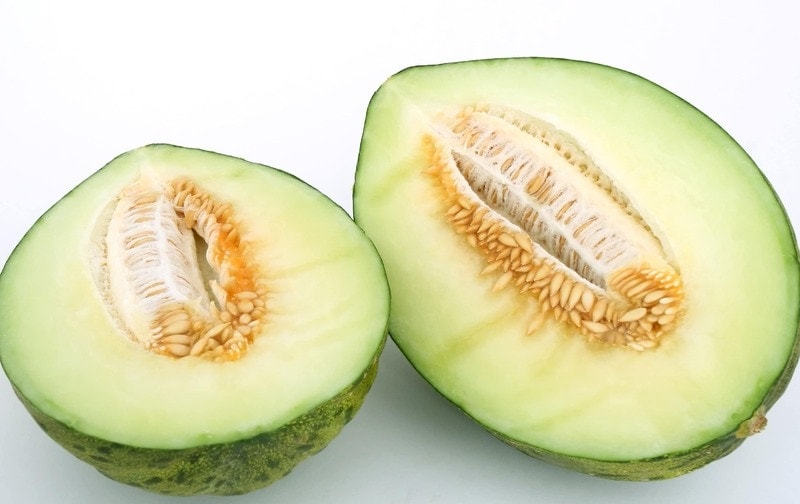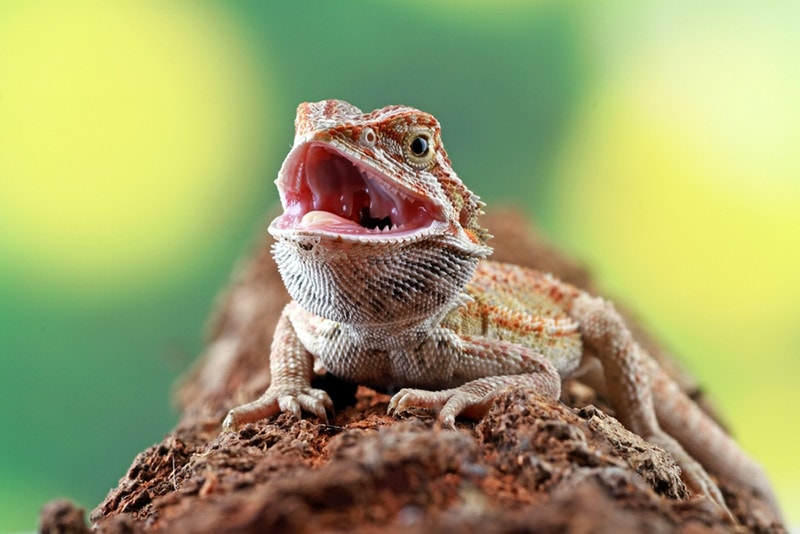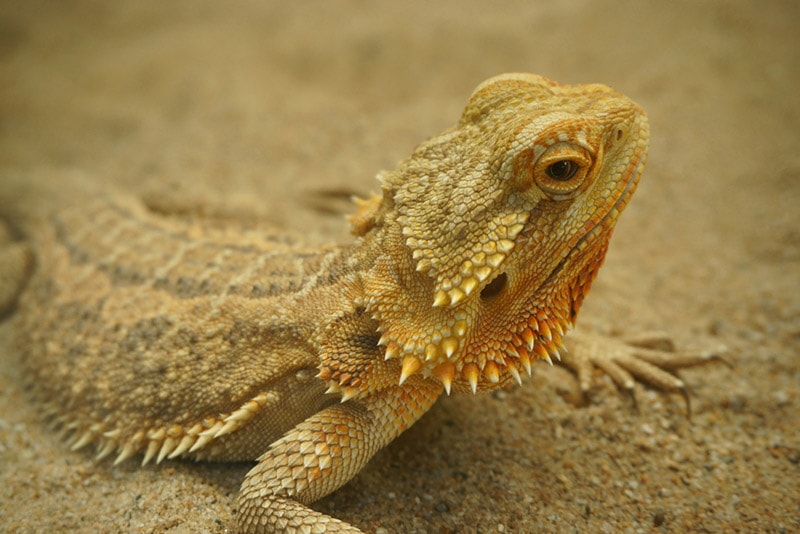Can Bearded Dragons Eat Spring Mix? Vet-Approved Facts & FAQ
Updated on
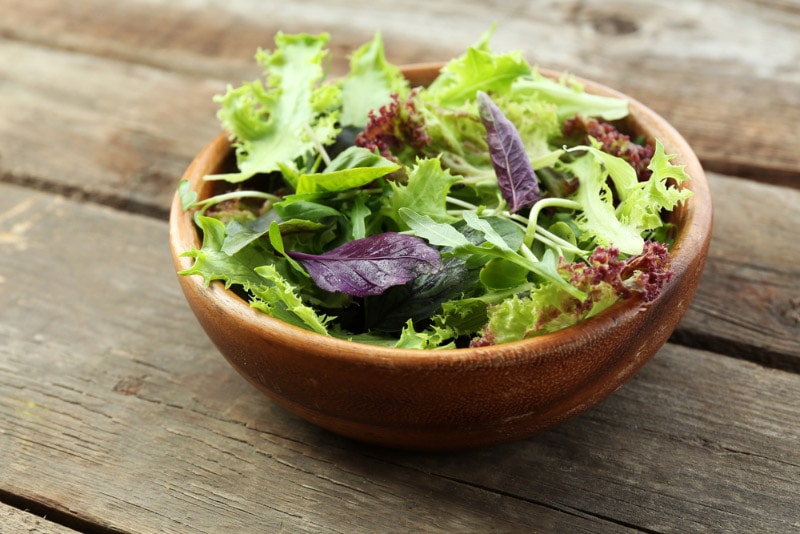
Click to Skip Ahead
Ensuring that your bearded dragon has a healthy diet is an essential part of owning this pet. That said, you should be aware of what is healthy and safe for your bearded dragon and what isn’t safe for them.
We all know that dark leafy greens are something that beardies need every day as part of a balanced diet. But would it be safe to offer a packaged spring mix to your bearded dragon?
There isn’t a simple yes or no answer to this because it depends on what kind of spring mix you have. Some of the vegetables in certain spring mixes won’t be good for your beardie.
Let’s discuss what vegetables are good for your bearded dragon and which ones you should avoid and why.
What Exactly Is Spring Mix?
Spring mix is a packaged mix of different lettuces, most often used for salads. Each manufacturer uses different kinds of lettuce, though a common ingredient is baby lettuce.
A typical spring mix includes:
- Baby lettuce
- Spinach
- Red romaine
- Green romaine
- Red oak leaf
- Green oak leaf
- Chard
- Arugula
- Kale
- Tango lettuce
- Spinach
- Butter lettuce
- Endive
- Radicchio
This list doesn’t include every ingredient that you might find in a spring mix, but these are the most common ones. Additionally, spring mix is washed before it’s packaged.

Can Bearded Dragons Eat Spring Mix?
Whether a bearded dragon can eat spring mix entirely depends on the contents. Here are a couple of ingredients to be cautious about.
Spinach
While leafy greens are good for beardies, not all varieties are recommended, including spinach. It contains oxalates, which bind with calcium. With too much spinach in their system, beardies can’t efficiently utilise calcium, which can lead to medical issues like metabolic bone disease.
However, you would generally need to feed spinach to your beardie every day for this to occur, so it’s okay to feed them this leafy green on occasion.
Additives
Ensure that the spring mix is free from any chemicals and preservatives, which include additives and pesticides. Fortunately, most manufacturers pre-wash the lettuce before packaging it.
Otherwise, you’ll need to wash it yourself, and the same goes for any fruit and vegetables that you feed your bearded dragon. The best way to remove pesticides from veggies is by rinsing them under running water in a colander.
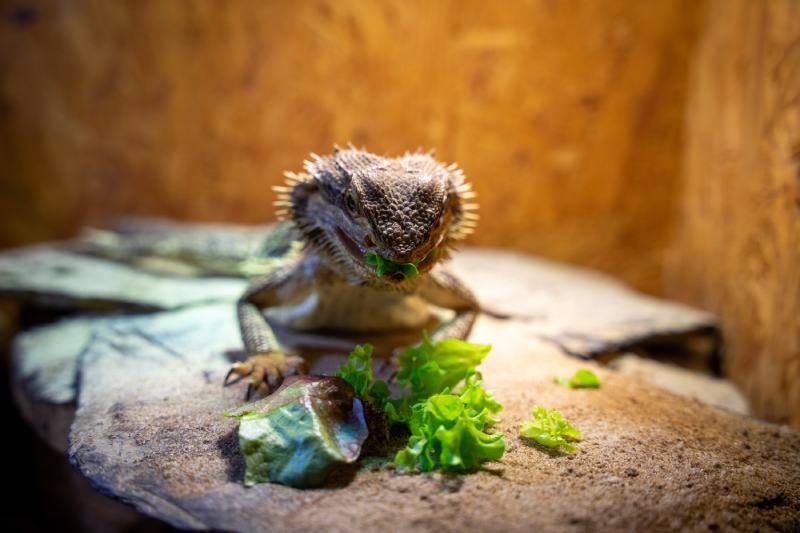
What Are the Best Vegetables to Feed Your Bearded Dragon?
Bearded dragons require a variety of dark, leafy greens every day. This enables them to have different vitamins and minerals, leading to a more balanced diet. Aim for vegetables with a high calcium-to-phosphorus ratio, which will help prevent metabolic bone disease. Depending on the age of your bearded dragon they will also need insect protein daily. As they age they become more herbivorous but they are an omnivorous species.
Daily
Vegetables that you can feed your beardie daily are:
- Alfalfa hay
- Chicory
- Collard greens
- Dandelion leaves
- Endive
- Escarole
- Mustard greens
- Turnip greens
Several vegetables on this list are also found in most spring mixes. If you happen to have a spring mix with these greens, as long as they are washed, you can feed it to your pet.
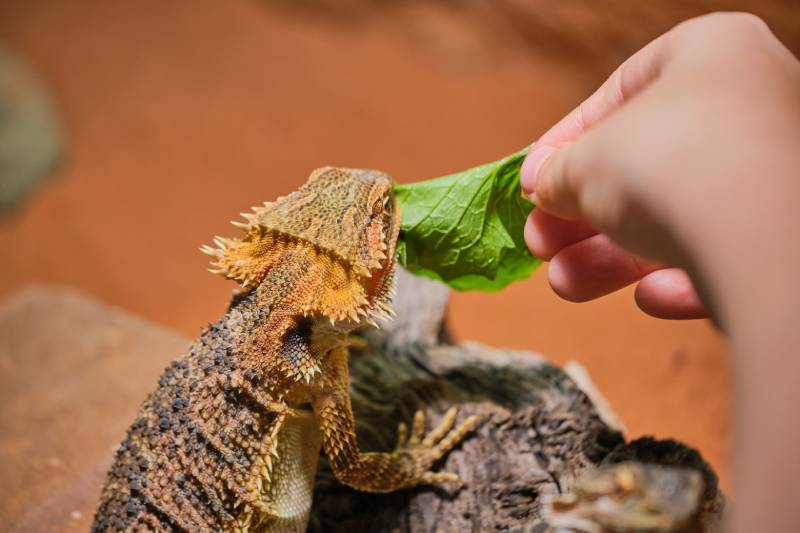
A Few Times a Week
The following veggies are safe for beardies but contain a small number of oxalates, which bind to calcium. So, while it’s okay to feed these vegetables to your bearded dragon, do so only on occasion and in small amounts:
- Acorn Squash
- Bell peppers
- Carrots
- Cilantro
- Green beans
- Kohlrabi
- Parsley
- Radicchio
- Watercress
Every Other Week
These vegetables are suggested for feeding around every second week to increase variety but are not ideal for more regular feeding.
- Celery
- Cucumber
- Green Cabbage
- Kale
- Peas
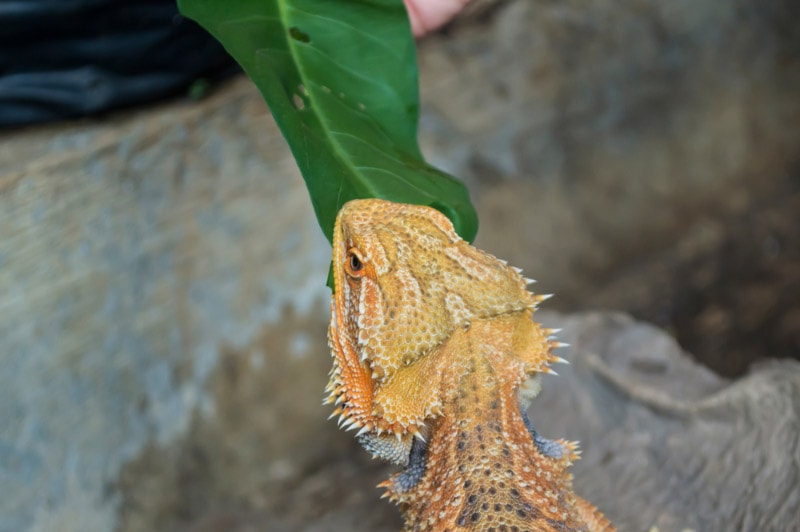
Rarely
The following greens contain high levels of oxalates. They should only be given on rare occasions and in small amounts. Many beardie owners just avoid these altogether:
- Beet greens
- Parsley
- Spinach
- Swiss chard
You’ll want to avoid lighter green lettuces like iceberg because they offer few nutritional benefits and contain a large amount of water, which can lead to diarrhea.
FAQs
What Kind of Protein Is Good for Bearded Dragons?
Bearded dragons are omnivorous, so while they need vegetables, they also need live insects for protein. The following are all nutritious for beardies:
- Butterworms
- Cockroaches
- Crickets
- Dubia roaches
- Earthworms
- Hornworms
- King worms
- Mealworms
- Silkworms
- Superworms (in moderation)
- Wax worms (in moderation)
You can find many of these in pet stores, and some beardie owners will breed and keep their own. The general rule is to put the insects in your beardie’s enclosure and remove any uneaten ones after about 10 minutes. The insects should be gut loaded before feeding to your beardie.
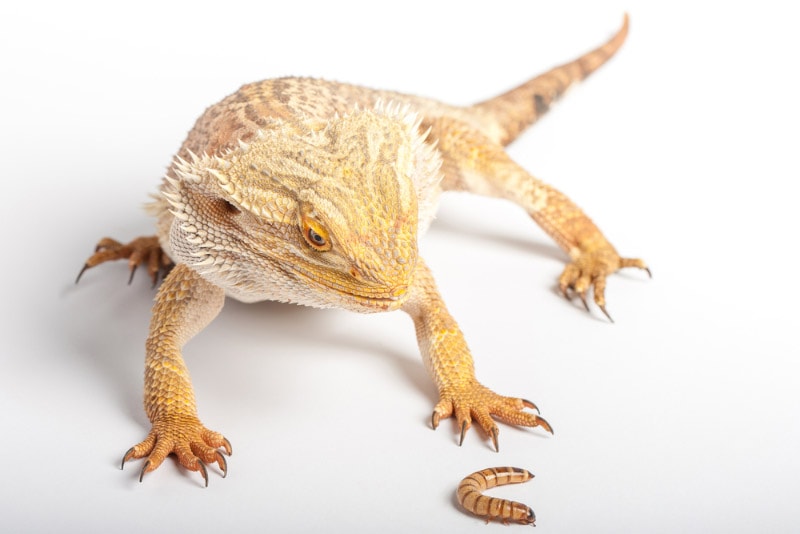
Can Bearded Dragons Eat Fruit?
Fruit is an excellent healthy treat, but it should only comprise a small part of your beardie’s diet. The following fruits are all safe for beardies:
- Apples
- Apricots
- Bananas (including the skin)
- Dates
- Figs
- Grapes
- Guava
- Kiwi
- Mangoes
- Melons
- Peaches
- Pears
- Raspberries
- Strawberries
- Tomatoes
What Vegetables Should You Not Feed Your Bearded Dragon?
Here are vegetables and other foods that you should never feed your beardie:
- Avocados
- Buttercups
- Garlic
- Leeks
- Mushrooms
- Onions/chives
- Rhubarb

Preparing Food for Your Bearded Dragon
Any fruits or vegetables should be thoroughly rinsed and chopped into manageable-sized pieces. Aim for raw veggies as much as possible, as cooking can remove some of the essential nutrients. Raw foods also more closely resemble a bearded dragon’s natural diet in the wild.
Be sure to remove any stems that are tough and stringy, like those of kale. This is another reason that chopping them into small pieces is important; otherwise, your beardie could choke.
Conclusion
The final answer is that a spring mix can be safe, depending on what kind of lettuce it has and whether it’s washed. So, unless you know what each kind of lettuce is by sight (or if the bag is thoroughly labeled), you might not be able to figure out the right ones to give your beardie.
Speak to your vet if you’re uncertain about what you should be feeding your pet, and keep researching! You’re clearly taking your role as a beardie owner seriously, so you’re already doing an excellent job!
See also:
- Can Bearded Dragons Eat Sage? Vet-Reviewed Nutrition Facts & FAQ
- Can Bearded Dragons Eat Hibiscus Flowers? Vet-Reviewed Nutrition Facts & FAQ
Featured Image Credit: Africa Studio, Shutterstock


